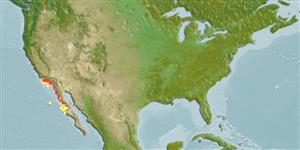Teleostei (teleosts) >
Perciformes/Zoarcoidei (Eelpouts and pricklebacks) >
Opisthocentridae ("Rearspined fin pricklebacks")
Etymology: Lumpenopsis: Latin, lumpus, an uncouthlooking spiny-finned fish of a leaden-blue colour + Greek, opsis = appearance (Ref. 45335); clitella: From the Latin clitella meaning saddle, in reference to the series of dark, dorsal saddles (Ref. 51122).
Environment: milieu / climate zone / depth range / distribution range
Ecology
Marine; demersal; depth range 54 - 100 m (Ref. 51122). Tropical
Eastern Central Pacific: southern California, USA.
Size / Weight / Age
Maturity: Lm ? range ? - ? cm
Max length : 5.3 cm SL male/unsexed; (Ref. 51122); 5.5 cm SL (female)
Short description
Identification keys | Morphology | Morphometrics
Dorsal spines (total): 47 - 48; Dorsal soft rays (total): 0; Anal spines: 1; Anal soft rays: 30 - 31; Vertebrae: 53 - 54. No scales on cheek; 138-145 irregular scale rows along midline; ventralmost 3-6 pectoral fin rays unbranched; eye relatively small (5 times in HL); dorsal sensory pores relatively small (diameter of anteriormost temporal pore, commissural pore and median supratemporal pores less than length of nostril tube); five or six spots along dorsal fin; eight dorsal saddles on body and little pigment below midline (Ref. 51122). Caudal fin rounded (Ref. 51122).
Life cycle and mating behavior
Maturity | Reproduction | Spawning | Eggs | Fecundity | Larvae
Hastings, P.A. and H.J. Walker Jr., 2003. Lumpenopsis clitella: a new species of prickleback (Teleostei: Stichaeidae) from southern California, with comments on Lumpenopsis Soldatov. Copeia 2003(4):803-809. (Ref. 51122)
IUCN Red List Status (Ref. 130435: Version 2024-2)
Threat to humans
Harmless
Human uses
Tools
Special reports
Download XML
Internet sources
Estimates based on models
Preferred temperature (Ref.
123201): 7.7 - 10.4, mean 8.8 °C (based on 11 cells).
Phylogenetic diversity index (Ref.
82804): PD
50 = 0.5625 [Uniqueness, from 0.5 = low to 2.0 = high].
Bayesian length-weight: a=0.00102 (0.00046 - 0.00225), b=3.06 (2.88 - 3.24), in cm total length, based on all LWR estimates for this body shape (Ref.
93245).
Trophic level (Ref.
69278): 3.1 ±0.5 se; based on size and trophs of closest relatives
Fishing Vulnerability (Ref.
59153): Low vulnerability (10 of 100).
